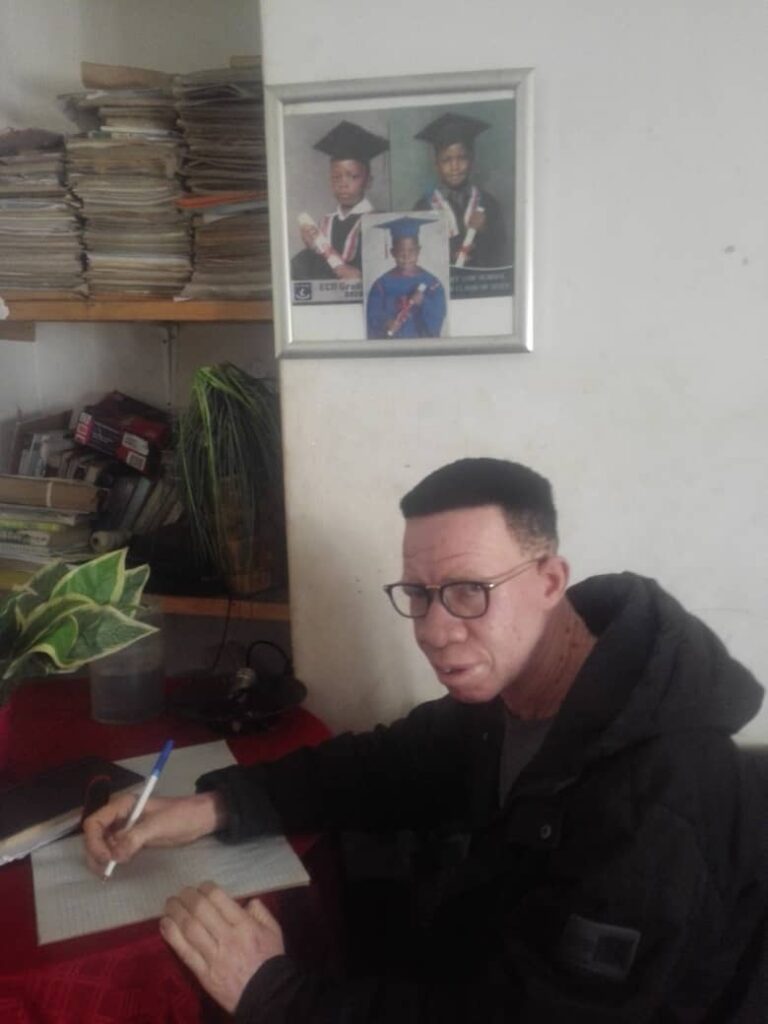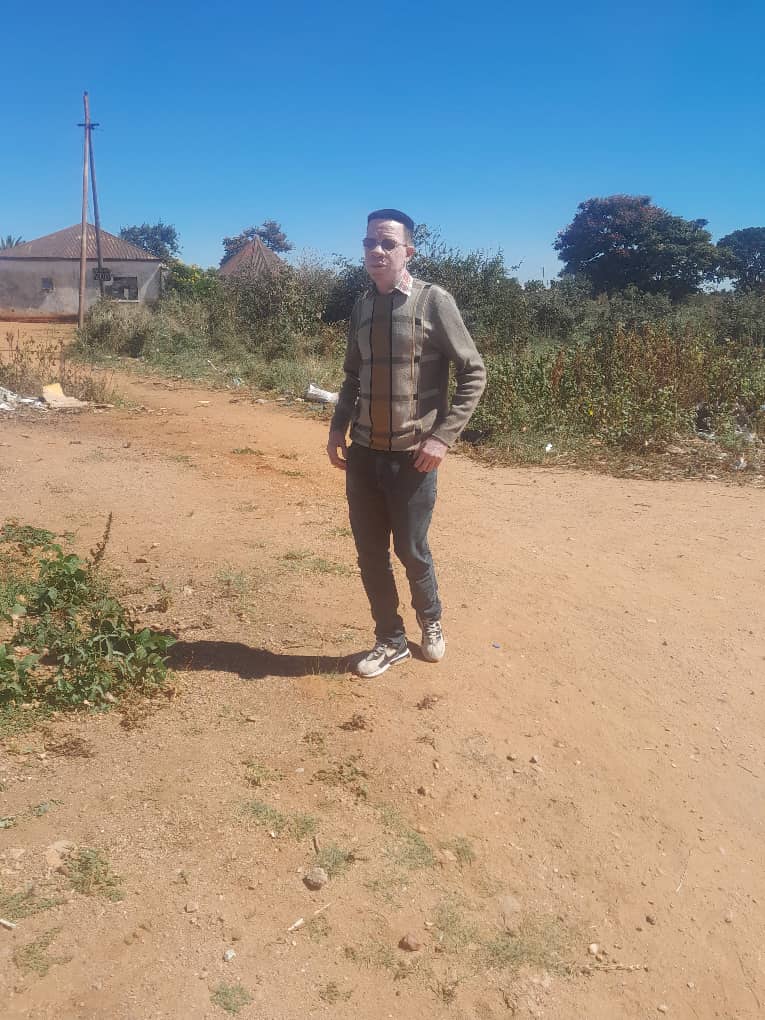In the dusty, vibrant streets of Tshabalala township in Bulawayo, where minibus horns form a daily chorus and children’s laughter blends with the clang of backyard metalwork, a quiet force of literary brilliance is at work. His name? Mthokozisi Ngubo, a creative writer, a mathematics and English tutor, and, dare we say it, Zimbabwe’s next great literary export. He was born and raised in Madlelenyoni village, deep in the heart of Ntabazinduna, a true son of the rural soil, shaped by tradition and the rhythms of village life.
By day, Ngubo is the friendly neighbourhood academic, a calm and knowledgeable tutor guiding students through the tangled world of algebra, quadratic equations, and Shakespearean sonnets. He teaches Mathematics up to O-Level and English up to A-Level and has been doing so for over seven years. But when night falls, the chalk dust settles, and the township quiets, another side of Mthokozisi awakens, the storyteller, the dreamer, the relentless scribe with ink-stained fingers and a head full of worlds waiting to be born.
“I do most of my writing at night when there’s peace and I can think properly,” he says with a quiet smile, as if revealing the location of some secret creative wellspring. For Ngubo, writing isn’t just a hobby or a side hustle. It’s something deeper, something elemental. “It’s more about expressing the power of my imagination than writing for a particular audience,” he says. And what an imagination it is.
Ngubo’s writing journey started not in lecture halls or elite workshops but in the hallways of elementary school. “I’ve been writing since I was a kid,” he recalls. But it wasn’t until 2015 that he began taking his craft seriously, carving out time between tutoring sessions and everyday life to put pen to paper with purpose. And what he’s produced since then is nothing short of astounding.
He’s written several English short stories, a collection of nearly 50 poems, a novel titled The Distant Mountains, and an isiZulu drama, aptly titled Iyokunqotshwa Yizingane (loosely translated: “It Shall Be Conquered by the Children”). And if that wasn’t enough, he’s already in the early stages of writing a thrilling new novel called The Fugitive.
“Most of my short stories have unfortunately been lost,” he admits, “but I still have a few left, The Stolen Jacket and The Contract among them.” These stories, handwritten and lovingly preserved, serve as a reminder of the importance of archiving African voices, even when the digital infrastructure may not always be in place.
He stores his poems on Google, with powerful titles like The Mighty Zambezi, The Table Mountain, and He Is Gone reflecting a deep love for the land and its emotional echoes. Thematically, his work is often rooted in African fiction and the mysteries of folklore, which, as he puts it, “felt almost like reality” when he was growing up.
Every great writer stands on the shoulders of those who came before, and for Ngubo, those shoulders are distinctly African. His biggest inspirations include literary legends such as Ngũgĩ wa Thiong’o, Chinua Achebe, and Shimmer Chinodya (whom he affectionately refers to as “Shima Chinojga”—a poetic slip, if ever there was one).
But perhaps the most touching influence came not from a celebrated icon but from a local hero: his late high school teacher, Melusi Mpofu. “He was a Ndebele teacher, never published, but his short stories were so gripping,” Ngubo recalls. “He inspired me in ways I can’t even explain.”
Such grassroots inspiration is a key theme in Ngubo’s life. Raised in a rural background, his works pulse with the rhythm of the land, the traditions, and the oral histories that shaped him. His debut novel, The Distant Mountains, explores the taboo of disability in a traditional African village. The protagonist’s survival in the face of deep-rooted cultural beliefs offers a potent commentary on both oppression and resilience, exactly the kind of layered, authentic storytelling the African literary scene needs more of.
Ask Ngubo how he writes, and he’ll tell you it’s a blend of vision and instinct. “I follow a general rough outline, but the finer details surface as I write,” he explains. He often starts with a strong main character and lets the narrative unfold naturally, allowing side characters to emerge organically and deepen the plot. It’s a method that mirrors the traditional African storytelling style, rich, fluid, and alive.
Despite his organic approach, Ngubo is also disciplined. “Once you commit yourself to writing, don’t stop until you finish your piece of work,” he advises. “Otherwise, you end up with multiple manuscripts that are only half done.” That, he says, is a golden rule he learned from a British author, one who famously spent ten years writing a novel that went on to become a bestseller. The name escapes him, but the lesson stuck: patience, endurance, and vision are what separate the dreamers from the published.
Though not yet published, Ngubo has made strides toward getting his work out. He once submitted a story to Drum Magazine, a respected platform for African writers, but it didn’t make the cut. No matter, he remains undeterred.
“I haven’t entered competitions yet,” he says, “but I plan to. I’m also exploring digital platforms to promote my work.” When asked about audiobooks or screen adaptations, he admits that while he hasn’t thought much about TV or film, his Zulu drama was indeed envisioned for radio, specifically Ukhozi FM, South Africa’s largest station. With its broad reach and cultural impact, it’s the perfect home for a story as rooted and resonant as Iyokunqotshwa Yizingane.
As for writing in more commercial genres like romance or thrillers? He grins. “I’m not much into romance,” he says, “but a thriller? Definitely. That’s growth.”
Mthokozisi Ngubo is not just another aspiring writer. He is a literary mind shaped by tradition, sharpened by struggle, and driven by passion. His stories carry the spirit of Africa, its complexities, contradictions, and charms. And though he hasn’t yet landed a publishing deal, it’s only a matter of time.
If Zimbabwe ever needed a new literary hero—someone who writes not from ivory towers but from dusty townships and rural landscapes, it has found one in Mthokozisi Ngubo.
Watch this space. A quiet revolution is brewing in Tshabalala.




